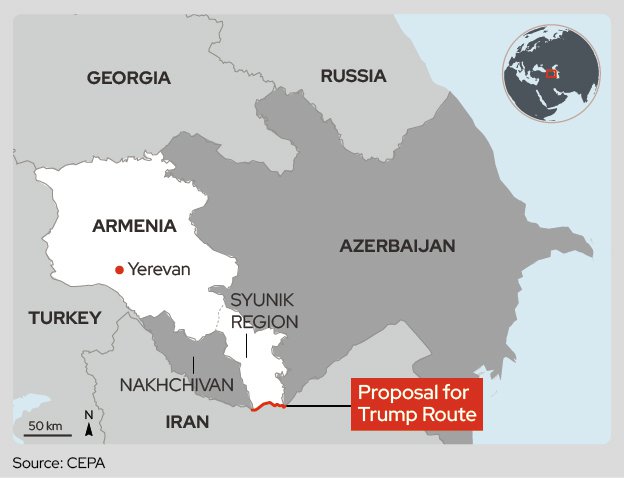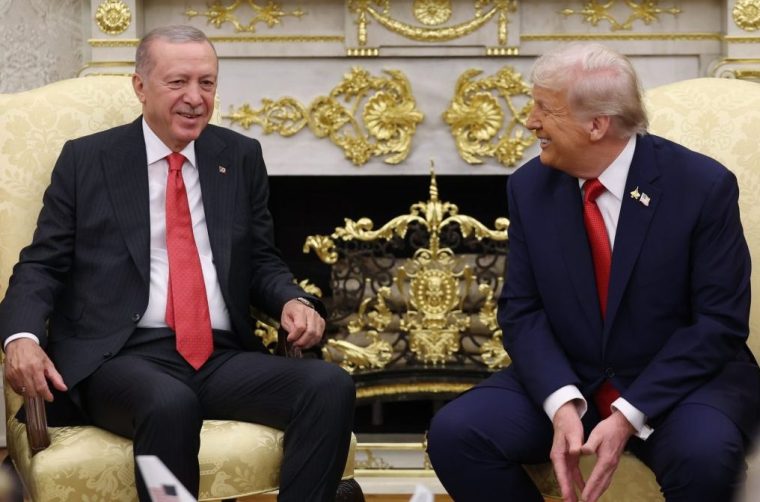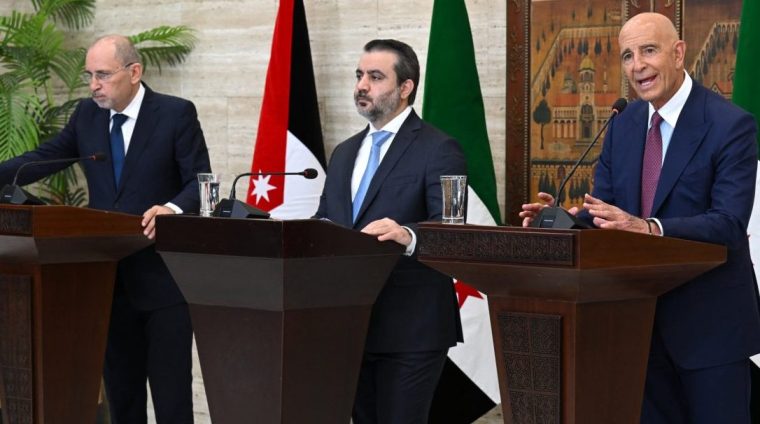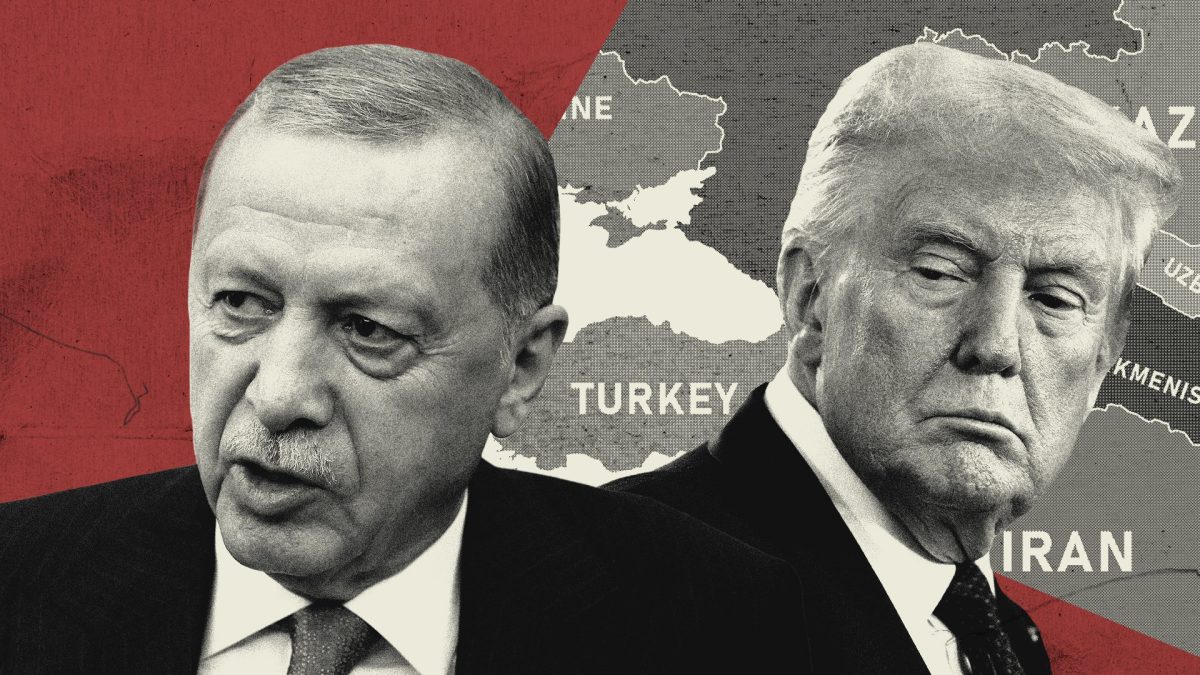Erdogan is trying to make the most of the US President’s unconventional approach to foreign policy
WASHINGTON, DC – Just above Iran, in an area Russia considers its backyard, connecting Turkey to the Caspian Sea, lies a potentially hugely lucrative and globally important transit corridor, branded the Trump Route for International Peace and Prosperity, or Tripp.
In August, the White House signed several deals giving it a 99-year mandate to oversee the creation and operation of the “Trump route”, using Armenian land subleased to the US.
It marks a new phase for Turkish President Recep Tayyip Erdogan, who has notable personal rapport with Donald Trump, in which he stands to gain new influence in Eurasia’s shifting geopolitical realities and fraught challenges.
New FeatureIn ShortQuick Stories. Same trusted journalism.
With military deals on the table, the US President’s transactional, business-minded style has fostered a direct channel of engagement with Ankara.
Across key international dossiers – Syria, the South Caucasus, and Ukraine – there is much strategic alignment between the US and Turkey with Trump back in the White House. Additionally, Trump and Erdogan have some similar views of presidential power — a dynamic that seems to help them see eye-to-eye while fostering some mutual understandings on issues pertaining to leadership.
Yet tensions over Gaza and lingering concerns in Ankara about Trump’s unpredictability and lack of commitment temper the optimism, and mean the relationship can be volatile. From Ukraine to Iran and Yemen, the foreign policy of Trump 2.0 has witnessed many sudden changes.
On 25 September, Trump hosted the Turkish leader at the White House for the first time since 2019, focusing on issues like military sales, trade, and global conflicts. The meeting was a positive step towards thawing relations, with Trump praising Erdogan’s role in Syria.
Erdogan this Wednesday said he was hopeful the meeting would lead to a deal for the US to sell F-35s to Turkey and lift Caatsa (Countering America’s Adversaries Through Sanctions Act) sanctions on its defence sector, applied in 2020 over Turkey’s purchase of Russian S-400 air defence systems.
“Our visit has ushered in a new era in Turkish-US relations and further strengthened the dialogue and friendship between us,” he declared.
The preliminary peace deal between Azerbaijan and Armenia, brokered by the White House in early August, marked a clear win for Turkey. If Tripp materialises, Ankara stands to achieve its long-held goal of expanding influence in Central Asia while circumventing reliance on routes through Georgia or Iran and advancing its broader “Turkic world” vision.
Trump’s goals
Tripp has been proposed before under a different name by Azerbaijan. The so-called Zangezur Corridor is a 40km (25-mile) stretch connecting Azerbaijan proper to its exclave, Nakhchivan, and then on to Turkey.
Ankara has broadly welcomed the waning influence of Russia and Iran in the South Caucasus, as well as the potential opening of the Zangezur Corridor. But the US role as mediator somewhat complicates Turkey’s strategic calculus.
 inews
inews
The US-Turkey alignment is not without caveats. Trump’s unpredictability, paired with strong disagreements over Israel and Hamas and growing suspicions about US intentions in Syria and the South Caucasus, mean that Ankara is likely to remain cautious.
“Ideally, Ankara would have preferred to lead the process itself to consolidate a new Caucasian identity based on shared heritage and autonomy from great-power rivalries,” said Dr Serhat Suha Cubukcuoglu, director of the Turkey programme at Abu Dhabi’s Trends Research and Advisory.
“The concern in Ankara is that Washington may not only act as conduit but also use its foothold to project influence eastward, via establishing military bases in Armenia for instance, constraining Turkey’s strategic depth and curbing its only land route to Azerbaijan, the Caspian, and by extension to Central Asia,” he added.
Tripp stands to advance Turkey’s national interests on multiple fronts, notably by strengthening the East–West corridor that links China to the UK and elevating Turkey’s position as a logistics hub at the crossroads of Europe and Asia. Over the coming decades, the Turkish economy is poised to reap substantial benefits from this enhanced connectivity.
Tripp could also mitigate Ankara’s exposure to supply disruptions by opening new channels for oil and gas imports from the Caspian and Central Asia.
Close friends
Taken together, the second Trump administration’s foreign policy has, thus far, largely aligned with Ankara’s strategic goals, offering Turkey a more flexible and personalised channel of engagement than under the Biden administration.
“Other than [Gaza], I believe that there’s no single issue [in which Washington and Ankara] contradict with each other,” Dr Murat Aslan, associate professor of international politics at Hasan Kalyoncu University in southern Turkey, told The i Paper. “We can observe Libya, Syria, Iraq, or Armenia and Azerbaijan, and Russia and Ukraine – I believe that the foreign policies of both countries complement each other and that’s why Trump complements Erdogan.”
 Erdogan and Trump met in the White House last month. The US President’s transactional, business-minded style has fostered a direct channel of engagement with Ankara (Photo: Murat Cetinmuhurdar/Turkish Presidency/Anadolu via Getty)
Erdogan and Trump met in the White House last month. The US President’s transactional, business-minded style has fostered a direct channel of engagement with Ankara (Photo: Murat Cetinmuhurdar/Turkish Presidency/Anadolu via Getty)
This warming of ties is underscored by the appointment of Thomas Barrack, a longtime Trump confidant and close associate, as US ambassador to Ankara. Trump has entrusted this key post to someone he knows well, admires, and deeply relies upon.
Barrack is also serving as Trump’s special envoy to Syria and Lebanon, functioning in a role akin to an under-secretary, albeit one based in the Middle East rather than Washington.
His involvement is especially significant given the sensitivity of these regional portfolios and his uniquely close relationship with the President, which lends added weight to his diplomatic efforts.
Barrack has voiced the Trump administration’s support for new Syrian president Ahmed al-Sharaa’s pro-Ankara government. Erdogan, along with Saudi Crown Prince Mohammed bin Salman, played a critical role in convincing Trump to lift US sanctions on Syria in May.
“The United States and Turkey seem to be pretty well aligned on Syria compared with the Biden administration, which chose to partner with the YPG [Peoples’ Protection Units], the branch of the PKK [Kurdistan Workers’ Party] in Syria,” Matthew Bryza, the former US ambassador to Azerbaijan, told The i Paper.
 US ambassador to Turkey and special envoy for Syria Tom Barrack, right, with the foreign ministers of Jordan and Syria, Ayman Safadi, left, and Asaad al-Shaibani, centre, after the signing of an agreement in Damascus last month (Photo: Louai Beshara /AFP)
US ambassador to Turkey and special envoy for Syria Tom Barrack, right, with the foreign ministers of Jordan and Syria, Ayman Safadi, left, and Asaad al-Shaibani, centre, after the signing of an agreement in Damascus last month (Photo: Louai Beshara /AFP)
Yet Barrack has been notably less active in visiting, engaging with, and commenting on Syria in recent months compared to his earlier involvement, which could be related to Israeli military intervention in Syria – carried out under the banner of defending the Druze community, including its bombing of Syria’s defence ministry on 16 July.
Israel’s continuing military campaigns – combined with Syria’s entrenched divisions – present serious challenges to Damascus’s prospects for long-term stabilisation.
These dynamics also pose significant tests for the coherence of US-Turkey alignment regarding the future of post-Assad Syria. In Ankara, doubts persist about Washington’s commitment to the principle of Syrian national unity.
Dr Cubukcuoglu said there was suspicion in Ankara that the US could allow the YPG-PKK to indefinitely rule the chunk of territory it has seized, giving it power over Damascus and “posing a threat to Turkey’s own territorial integrity and sovereignty”.
Tensions that could spill over
On Ukraine, Trump and Erdogan have largely aligned, both calling for a swift diplomatic resolution and viewing continued bloodshed as counterproductive. Despite Turkey’s substantial military support for Kyiv – especially through drone exports – and its firm opposition to Vladimir Putin’s invasion and annexation, Erdogan has consistently opposed attempts by Ukraine to retake all its lost territory through war.
Erdogan’s stance on Ukraine is more or less the one Trump has embraced throughout his second term — with the exception of his different stance voiced on his Truth Social platform on 23 September regarding Ukraine having a chance at recovering all land in its UN recognised borders.
“President Trump is just so unpredictable, and his foreign policy approach just keeps on changing,” noted Bryza when discussing the US leader’s sudden 180 on Ukraine, which even surprised Ukrainian President Volodymyr Zelensky.
Erdogan has expressed deep disappointment with Trump over his support for Israel’s campaign in Gaza. Long a priority for the Turkish leader, Gaza once again took centre stage when Erdogan, addressing the UN General Assembly, displayed graphic images of Palestinian victims and condemned the war as humanity’s gravest crisis — directly criticising Washington’s backing of Israel.
 Palestinians who were displaced to the southern part of Gaza make their way back after a ceasefire between Israel and Hamas went into effect (Photo: Ebrahim Hajjaj/Reuters)
Palestinians who were displaced to the southern part of Gaza make their way back after a ceasefire between Israel and Hamas went into effect (Photo: Ebrahim Hajjaj/Reuters)
Yet, with Ankara formally endorsing Trump’s “peace” initiative for Gaza – and going so far as to send Turkish intelligence chief Ibrahim Kalin to join the third day of talks in Egypt on 8 October – there is potential for some degree of US-Turkey alignment on Gaza.
With the first phase of the peace deal agreed, a complex process lies ahead, and there are no assurances it will proceed smoothly. Still, Trump’s praise for Ankara’s key role in helping to facilitate the diplomatic breakthrough on 9 October underscores how much the White House values Turkey’s influence over Hamas.
While Erdogan has managed to compartmentalise various issues in Ankara’s ties with Washington, Gaza remains a delicate one. Furthermore, Israel’s future actions risk escalating tensions between the US and Turkey, depending on how Tel Aviv’s agenda clashes with Ankara’s in post-Assad Syria.
“Israeli and Turkish interests… collide directly in Syria… creating ripple effects across other theatres and raising the risk of dangerous chain-ganging should these tensions spill over into armed conflict,” said Dr Cubukcuoglu.
For now, Trump 2.0 has brought Turkey more gains than losses, but the durability of this momentum hinges not only on converging interests but also on Trump’s steadiness and Erdogan’s navigation of this complex partnership.
For Erdogan, Tripp may indeed open new geopolitical horizons, but sustaining the momentum will depend less on shared ambitions and more on how long Ankara can ride the unpredictable currents of Trump’s foreign policy.
